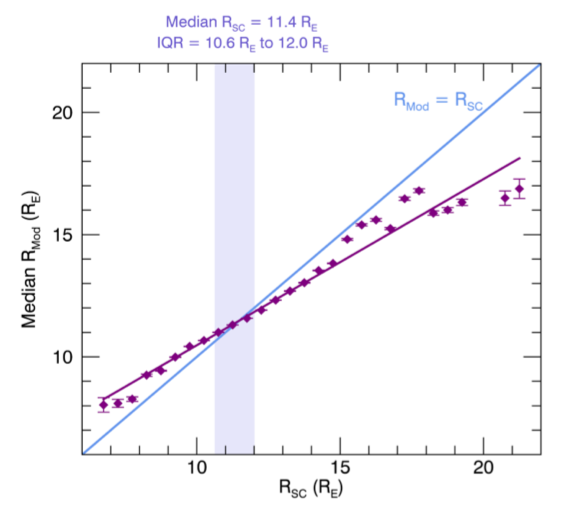MIST
Magnetosphere, Ionosphere and Solar-Terrestrial
Do Statistical models capture magnetopause dynamics during sudden magnetospheric compressions?
By Frances Staples (Mullard Space Science Laboratory, UCL)
Under steady-state solar wind conditions, the magnetopause location is described as a pressure balance between internal magnetic pressure of Earth’s magnetic field and the external dynamic pressure of the solar wind. Under extreme solar wind driving, such as high solar wind pressure or strong southward-directed interplanetary magnetic fields, this boundary is located much closer towards Earth. These compressions of the magnetopause can play a significant role in the depletion of magnetospheric plasma in the Van Allen Radiation Belts, via magnetopause shadowing. Statistical models of the magnetopause location are often used in investigations of radiation belt losses through the magnetopause. However, empirical models cannot capture the time varying nature of the magnetopause during such events, which are often associated with large step-changes in solar wind conditions.
We constructed a database of ~ 20,000 spacecraft crossings of the dayside magnetopause to assess the accuracy of the commonly used Shue et al. (1998) model. For the majority of our measurements, the Shue et al. (1998) model accurately represented the magnetopause location within an error of ± 1 RE. However, when the magnetopause was compressed below 8 RE, the model overestimated the radial distance of the magnetopause by more than 1 RE on average. This result is demonstrated in the Figure as the data does not follow the blue line, which represents where the modelled location is equal to measured location, for magnetopause measurements below 10 RE.

Figure: The median magnetopause location, RMod, calculated for a given measurement of the magnetopause by a spacecraft, RSC, is plotted by purple diamonds, and a best fit is shown by the purple line. The interquartile range of RSC (where 75% of magnetopause measurements were taken) is shown by the shaded region.
Furthermore, during sudden storm commencements, where interplanetary shocks impact the magnetosphere, the modelled magnetopause was significantly displaced from the measured location. Magnetopause measurements were on average 6% closer to the radiation belts, with a maximum of 42%. We conclude that statistical magnetopause parameterizations may not be appropriate during dynamic compressions of the magnetosphere and could underestimate the role of magnetopause shadowing on radiation belt dynamics. Models should be supplemented by magnetopause observations wherever possible and we have provided a dataset of THEMIS magnetopause crossing to be used by the research community.
For more information, please see the paper;
, , , , , , et al (2020). Do statistical models capture the dynamics of the magnetopause during sudden magnetospheric compressions?. Journal of Geophysical Research: Space Physics, 125, e2019JA027289. https://doi.org/10.1029/2019JA027289
The database of THEMIS and Geotail magnetopause crossings used in this study are openly available at https://doi.org/10.5281/zenodo.3700504 and https://doi.org/10.5281/zenodo.3719411 .